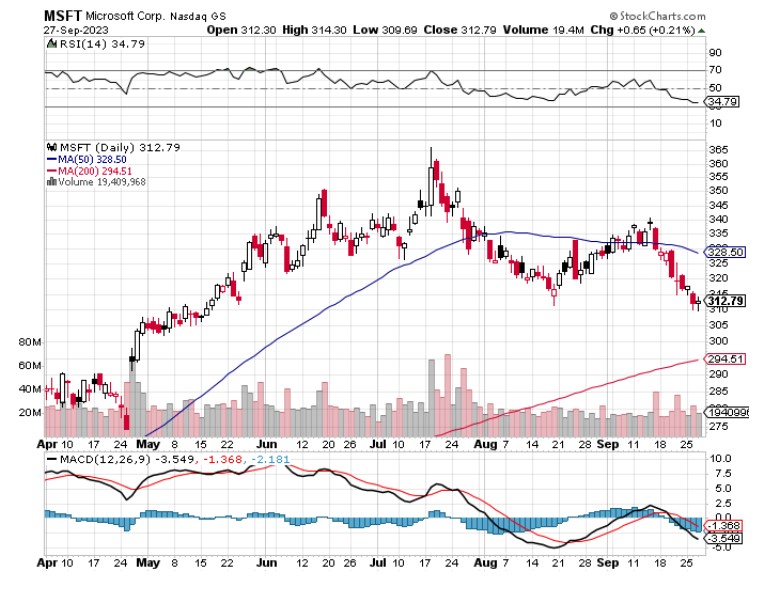A STEALTH PLAYER IN THE AI REVOLUTION
(MSFT), (GOOGL), (AMZN)
The artificial intelligence (AI) sector, currently valued at a whopping $137 billion, is poised to skyrocket, with projections showing a compound annual growth rate of 37% all the way through 2030.
This technological marvel is making waves across diverse industries, including manufacturing, healthcare, consumer products, and education, to name a few. It’s no wonder tech behemoths are scrambling to secure their foothold in this lucrative sector, innovating relentlessly to cater to the escalating demand for AI services.
While Nvidia (NVDA) has been stealing the limelight in the AI arena this year, the real goldmine might just be investing in the software giants crafting these revolutionary products.
Enter Microsoft (MSFT), a titan in the tech world, meticulously infusing AI enhancements across its renowned software array, including household names like Windows and Office. Given all its efforts over the past months, one thing is clear: Microsoft is on a mission to bring AI to the fingertips of millions, and it’s just getting warmed up.
Before delving into this, it’s time for a reality check.
The truth is, aside from Nvidia, the tech sector, particularly enterprise AI software, hasn’t really felt the AI adrenaline rush. While Microsoft is dreaming big with AI, it’s still a waiting game for investors to see the digits roll in.
By investing $1 billion in OpenAI in 2019 and adding another $10 billion this year, Microsoft has made a bold and strategic move that has firmly established its presence in the AI industry. With a 49% stake in the start-up, the tech titan has secured access to some of the most advanced AI technologies available.
Integrating OpenAI’s AI models into Microsoft’s widely-used services like Word, Excel, Azure, and Bing is just the tip of the iceberg. Microsoft is also on a quest to redefine productivity, with plans to unveil a plethora of AI tools on its subscription-based platform, Microsoft 365, which has already witnessed a 12% operating income growth in fiscal 2023.
But that’s not all. Microsoft’s cloud service, Azure, is making waves in the business sector, standing as the second-largest cloud market share holder after Amazon Web Services (AMZN). It’s the gateway for companies to access ChatGPT, and Microsoft is solidifying its AI stronghold, showing no signs of hitting the brakes.
Come November 1, Microsoft 365 Copilot will be launched for enterprise customers at $30 per month. J.P. Morgan analysts predict a 12- to 36-month adoption ramp period as enterprises meticulously test before full-scale adoption.
This AI functionality of Copilot would mean corporations shelling out millions more, with an employee costing $782 annually to include Copilot, compared to $432 for Office 365 alone.
Microsoft is also delving into generative AI functions within Bing Search. Still, with only an 8% increase in Search revenues for the July quarter, it seems Google, owned by Alphabet (GOOG, GOOGL), remains the search sovereign.
In terms of revenue, Microsoft reported $56.2 billion for FQ4, marking an 8% increase. So to truly make a splash, AI Copilot needs to rake in billions annually.
Although it sounds impossible, this goal is actually reachable. Even if only a measly 10% of Office customers embrace the new feature, Microsoft could already rake in $14 billion in sales boost, with a potential $100 billion of incremental revenue by 2027.
While tech stocks are often seen as volatile, Microsoft stands out as a symbol of reliability, with a sales footprint exceeding $200 billion in its most recent fiscal year, deriving from diverse revenue streams. The company has managed to keep overall sales on an upward trajectory, with a recent quarter revenue up by 8% and operating income at $24.3 billion, accounting for over 43% of sales.
Its alliance with OpenAI also ensures that it remains a formidable player in the AI arena, with its expansive market share in cloud computing amplifying its prospects. The integration of AI in Microsoft 365's Office suite could be a game-changer, potentially skyrocketing earnings. The potential upside from AI products makes Microsoft a compelling consideration for investors, especially given the current market weakness.
In a nutshell, Microsoft’s strategic moves in AI and its unwavering dominance in productivity services make it a noteworthy contender in the ongoing AI revolution. For investors, it’s time to keep a keen eye on this tech leader. After all, the AI wave is undeniably here, and Microsoft is riding it with finesse.

